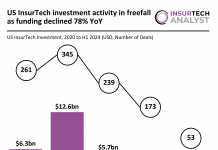The global COVID-19 outbreak could worsen business and funding conditions as well as changing private FinTechs’ exit options, according to a new report.
Rosenblatt Securities, the agency brokerage, has looked at the impact of the pandemic on the FinTech industry and warned that it is not looking good.
The firm stated that three factors could be affecting the industry. Firstly, ventures in the industry may face deteriorating business conditions in regards to demand and supply. Secondly, they could see their growth plans jeopardised as the funding conditions around the world weaken. Thirdly, FinTechs may also see their exit options change significantly.
“These forces may feed off each other, creating a vicious cycle where deteriorating business performance makes funding more difficult and vice versa, should the market downturn last long,” Rosenblatt Securities stated.
Having looked at previous market downturns, Rosenblatt Securities suggests that the impact on the sector may take six months to manifest. “While it is too soon to analyse the full impact of the COVID-19 disruption on private markets, if the public market dislocation is any indicator, substantial pain may lie ahead for private investing,” Rosenblatt Securities stated.
Looking at the competitive environment, it noted that the coronavirus-related pandemic could hurt startups particularly bad as this will be the first downturn many management teams experience, meaning they may not have the tools to deal with changing customer demand, struggles to retain talent and a capital squeeze.
Although Rosenblatt Securities noted that startups might have an advantage over their bigger and more established peers: they can adapt more easily thanks to their size and their costs are lower and more flexible, which could make them more attractive for investors.
Many FinTechs have positioned themselves in the market as alternatives to more traditional financial institutions. Incumbents, such as the Royal Bank of Scotland, have launched several initiatives to keep up with the new kids on the block.
However, the coronavirus might give incumbents a competitive advantage over FinTechs because their bigger brands, massive capitalisations and the fact that risk-averse customers tend to navigate towards familiar businesses.
As a result, customer-focused companies such as challenger banks will see their business performance shrink faster than business-to-business-oriented FinTechs. This reflection seemingly contradicts a previous report from Finance in Bold that suggested that UK neobank Revolut could grow thanks to the coronavirus making people more prone to use the FinTech’s cashless and digital services.
Furthermore, Rosenblatt Securities noted that different segments of the FinTech industry would be differently affected by the market slowdown.
Lending FinTechs such as the Swedish buy now, pay later unicorn Klarna would suffer the most due to lower valuations and the fact that borrowers may be unable to pay their debts.
Capital markets companies risk facing problems as international transactions could drop due to people stopping to travel because of the virus.
InsurTech companies may fare reasonably well as many insurers exclude pandemics from their coverage. Moreover, it could even increase the demand for products such as life insurance.
While payment companies such as Visa and Mastercard have warned that their revenues will drop because of COVID-19, they could benefit from embedded payments in non-financial services anymore online trading.
Looking at funding and valuations in particular, Rosenblatt Securities suggested that the coronavirus crisis could exacerbate the trend where companies’ valuations have stopped growing as massively between rounds as in the past. The days of funding rounds at humongous valuations are, if not at an end, at least few and far between.
Having surveyed investors in October about a market slowdown, Rosenblatt Securities said that the 58 FinTech unicorns around the world at the time could see their market valuations drop by up to 15%. This meant that around $76bn of the total unicorn market valuation could be wiped away.
Early-stage startups that have not yet been validated could also suffer as a result of the market slowdown whereas Series B to D scaleups would fair better and could even trade the same or at a reasonable premium if they are able to demonstrate the strength of their business models.
Focusing on funding, Rosenblatt Securities noted that investors would initially take advantage of lower valuations to get shares in promising startups.
Nevertheless, venture capital firms and other investors are likely to be more restrictive in their investment during and after the crisis, which could result in subdued investments in the months to come.
If the market continues to underperform into the autumn, investors will start to carefully consider who to keep giving money to and who to cut loose. “Deal structure and deal terms will shift in favour of investors,” suggested Rosenblatt Securities. “Liquidation preferences will likely climb up from the 1x during good times to 2-3x amidst a protracted slowdown. Anti-dilution clauses may also become more common, with the introduction of more stringent terms that recent term sheets didn’t have.”
Investors could also start to dial down their commitments and their fundraising plans.
As startups struggle, they become more likely to seek out more collaborations, investment or to be acquired by a bigger company. Mergers and acquisitions may become especially more common as initial public offerings have shut down for the next few months. To achieve liquidity, M&As are therefore the only exit option available, Rosenblatt Securites noted. And with the market environment having worsened, the resulting deals will favour the acquirers. WealthTech companies and neobanks were identified as especially likely to face M&A deals.
Copyright © 2020 FinTech Global










